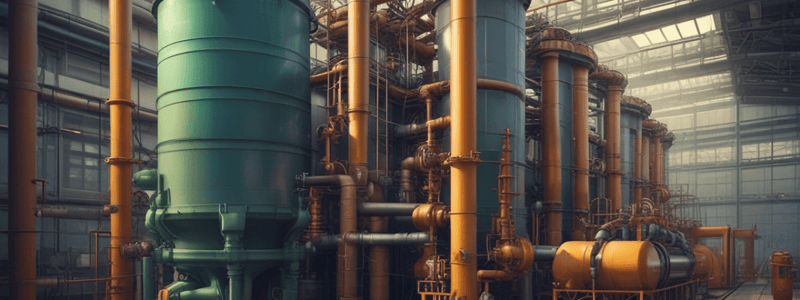Podcast
Questions and Answers
EASY What is the recommended frequency for using dip slides?
EASY What is the recommended frequency for using dip slides?
- Monthly
- Daily
- Weekly (correct)
- Quarterly
What is the purpose of incubating dip slides?
What is the purpose of incubating dip slides?
- To identify bacteria type
- To allow bacteria to grow (correct)
- To kill bacteria
- To sterilize the slides
What should be done if the dip slide results show high bacteria counts?
What should be done if the dip slide results show high bacteria counts?
- Replace the dip slides
- Take another sample and review operating procedures (correct)
- Drain and clean the cooling tower
- Shock the system with a large biocide dose
What is the unit of measurement for bacteria count on dip slides?
What is the unit of measurement for bacteria count on dip slides?
What is the role of operators in highly automated systems?
What is the role of operators in highly automated systems?
What is the purpose of inspecting the interior of the cooling tower?
What is the purpose of inspecting the interior of the cooling tower?
What is one of the reasons for monitoring plant equipment?
What is one of the reasons for monitoring plant equipment?
What is the main purpose of conductivity tests in cooling water systems?
What is the main purpose of conductivity tests in cooling water systems?
What is the purpose of pH tests in cooling water systems?
What is the purpose of pH tests in cooling water systems?
What does a corrosion coupon test measure in a cooling water system?
What does a corrosion coupon test measure in a cooling water system?
What is the main activity of solids maintenance in cooling water systems?
What is the main activity of solids maintenance in cooling water systems?
What is the purpose of a suspended solids test in cooling water systems?
What is the purpose of a suspended solids test in cooling water systems?
What is the purpose of Differential Microbial Analysis (DMA) in cooling water systems?
What is the purpose of Differential Microbial Analysis (DMA) in cooling water systems?
How often is the Differential Microbial Analysis (DMA) test conducted in cooling water systems?
How often is the Differential Microbial Analysis (DMA) test conducted in cooling water systems?
MEDIUM What is the primary benefit of using dip slides?
MEDIUM What is the primary benefit of using dip slides?
What is the typical temperature range for incubating dip slides?
What is the typical temperature range for incubating dip slides?
What action should be taken if the dip slide results show a count of 1 × 10^5 cfu/ml?
What action should be taken if the dip slide results show a count of 1 × 10^5 cfu/ml?
What is the purpose of reviewing operating procedures when dip slide results are high?
What is the purpose of reviewing operating procedures when dip slide results are high?
What is a critical role of operators in highly automated systems?
What is a critical role of operators in highly automated systems?
What is the purpose of visually inspecting equipment, such as feed pumps?
What is the purpose of visually inspecting equipment, such as feed pumps?
Why do operators conduct corrosion coupon tests?
Why do operators conduct corrosion coupon tests?
What is the purpose of conductivity tests?
What is the purpose of conductivity tests?
What is the importance of pH tests in cooling water systems?
What is the importance of pH tests in cooling water systems?
What is the main reason for monitoring plant equipment?
What is the main reason for monitoring plant equipment?
What is the purpose of solids maintenance in cooling water systems?
What is the purpose of solids maintenance in cooling water systems?
What is the purpose of biological activity measurements in cooling water systems?
What is the purpose of biological activity measurements in cooling water systems?
What is the purpose of Differential Microbial Analysis (DMA) in cooling water systems?
What is the purpose of Differential Microbial Analysis (DMA) in cooling water systems?
Why do operators perform manual conductivity tests?
Why do operators perform manual conductivity tests?
What is the primary reason for monitoring plant equipment?
What is the primary reason for monitoring plant equipment?
HARD What is the primary function of a dip slide?
HARD What is the primary function of a dip slide?
What is the purpose of corrosion coupon tests in cooling water systems?
What is the purpose of corrosion coupon tests in cooling water systems?
What is the recommended action when the dip slide results show a count of 1 × 10^5 cfu/ml?
What is the recommended action when the dip slide results show a count of 1 × 10^5 cfu/ml?
What is the primary benefit of using dip slides in cooling water systems?
What is the primary benefit of using dip slides in cooling water systems?
Why do operators perform manual conductivity tests?
Why do operators perform manual conductivity tests?
What is the primary role of operators in highly automated cooling water systems?
What is the primary role of operators in highly automated cooling water systems?
What is the purpose of pH tests in cooling water systems?
What is the purpose of pH tests in cooling water systems?
What is the purpose of inspecting the interior of the cooling tower?
What is the purpose of inspecting the interior of the cooling tower?
What is the main purpose of biological activity measurements in cooling water systems?
What is the main purpose of biological activity measurements in cooling water systems?
What is the purpose of solids maintenance in cooling water systems?
What is the purpose of solids maintenance in cooling water systems?
What is the purpose of reviewing operating procedures when dip slide results are high?
What is the purpose of reviewing operating procedures when dip slide results are high?
What is the purpose of Differential Microbial Analysis (DMA) in cooling water systems?
What is the purpose of Differential Microbial Analysis (DMA) in cooling water systems?
Why is it important to record and track conductivity test results?
Why is it important to record and track conductivity test results?
Flashcards are hidden until you start studying
Study Notes
Reasons for Monitoring
- Monitoring is necessary to gather information about equipment operation, identify and target issues before they become problems, reduce operating costs, and increase the life span of plant equipment.
Preventing Cooling Water Problems
- Conductivity tests are performed to determine dissolved solids concentrations, which increase with conductivity.
- Corrosion tests are used to identify corrosion in the system, including pH tests and corrosion coupon tests.
- pH tests help maintain a set pH range to minimize corrosion and scale deposition.
- Corrosion coupons provide a relative measurement of the system's corrosiveness.
- Solids maintenance involves cleaning filters and strainers regularly and performing suspended solids tests when necessary.
- Biological activity measurements are taken to detect microorganisms, using methods like Differential Microbial Analysis (DMA) and dip slides.
- Dip slides are used to detect bacteria and determine the number of bacteria in cfu/ml.
Biological Activity Measurements and Action
- If dip slide results are high (> 1 × 10^4), further action should be taken, including sampling, reviewing operating procedures, and shot-feeding biocide.
- If results continue to be high, the system should be shocked with a large one-time biocide dose.
Operator Responsibilities
- Operators must ensure empty chemical tanks are replaced, leaks are found and repaired, and regular conductivity and dip slide tests are conducted.
- They must also perform ongoing visual and operational checks of equipment, inspect the interior of the cooling tower, and visually inspect equipment for leaks or stuck valves.
Reasons for Monitoring
- Monitoring is necessary to gather information about equipment operation, identify and target issues before they become problems, reduce operating costs, and increase the life span of plant equipment.
Preventing Cooling Water Problems
- Conductivity tests are performed to determine dissolved solids concentrations, which increase with conductivity.
- Corrosion tests are used to identify corrosion in the system, including pH tests and corrosion coupon tests.
- pH tests help maintain a set pH range to minimize corrosion and scale deposition.
- Corrosion coupons provide a relative measurement of the system's corrosiveness.
- Solids maintenance involves cleaning filters and strainers regularly and performing suspended solids tests when necessary.
- Biological activity measurements are taken to detect microorganisms, using methods like Differential Microbial Analysis (DMA) and dip slides.
- Dip slides are used to detect bacteria and determine the number of bacteria in cfu/ml.
Biological Activity Measurements and Action
- If dip slide results are high (> 1 × 10^4), further action should be taken, including sampling, reviewing operating procedures, and shot-feeding biocide.
- If results continue to be high, the system should be shocked with a large one-time biocide dose.
Operator Responsibilities
- Operators must ensure empty chemical tanks are replaced, leaks are found and repaired, and regular conductivity and dip slide tests are conducted.
- They must also perform ongoing visual and operational checks of equipment, inspect the interior of the cooling tower, and visually inspect equipment for leaks or stuck valves.
Reasons for Monitoring
- Monitoring is necessary to gather information about equipment operation, identify and target issues before they become problems, reduce operating costs, and increase the life span of plant equipment.
Preventing Cooling Water Problems
- Conductivity tests are performed to determine dissolved solids concentrations, which increase with conductivity.
- Corrosion tests are used to identify corrosion in the system, including pH tests and corrosion coupon tests.
- pH tests help maintain a set pH range to minimize corrosion and scale deposition.
- Corrosion coupons provide a relative measurement of the system's corrosiveness.
- Solids maintenance involves cleaning filters and strainers regularly and performing suspended solids tests when necessary.
- Biological activity measurements are taken to detect microorganisms, using methods like Differential Microbial Analysis (DMA) and dip slides.
- Dip slides are used to detect bacteria and determine the number of bacteria in cfu/ml.
Biological Activity Measurements and Action
- If dip slide results are high (> 1 × 10^4), further action should be taken, including sampling, reviewing operating procedures, and shot-feeding biocide.
- If results continue to be high, the system should be shocked with a large one-time biocide dose.
Operator Responsibilities
- Operators must ensure empty chemical tanks are replaced, leaks are found and repaired, and regular conductivity and dip slide tests are conducted.
- They must also perform ongoing visual and operational checks of equipment, inspect the interior of the cooling tower, and visually inspect equipment for leaks or stuck valves.
Studying That Suits You
Use AI to generate personalized quizzes and flashcards to suit your learning preferences.




